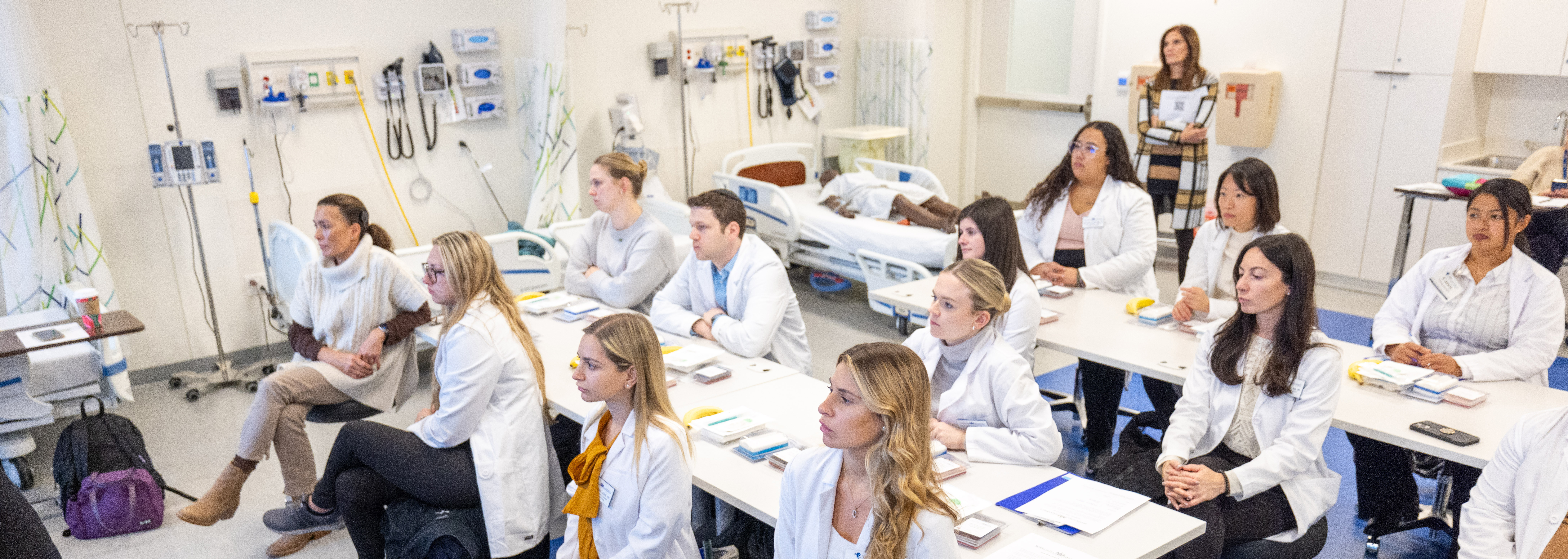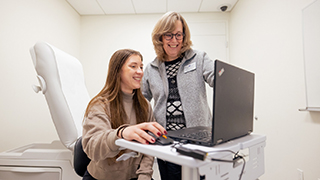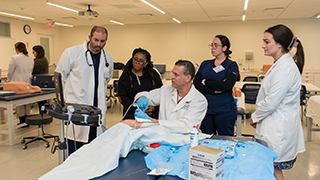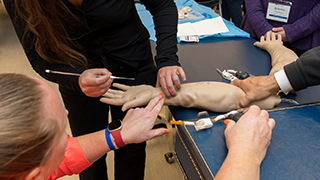
About M.S.N. Immersions
M.S.N. students participate in three in-person immersions at the Interprofessional Health Sciences campus that provide hands-on skill-building, faculty interaction, peer networking and career development. Each two-day event includes guest speakers — often M.S.N. alumni — who share post-graduation experiences and offer practical career advice.
Immersion 1 – Orientation
Year One (Program Start)
The first immersion introduces students to faculty, classmates and the resources that support their academic journey. Sessions cover the University’s technology platforms, APA writing style, library services and financial aid.
Immersion 2 – Practicum
Year Two (Early Fall)
Students learn and practice advanced clinical skills in a simulated environment, with training in physical exams and GYN/GU exams on standardized patients. Additional practice includes suturing, punch biopsies and incision and drainage. Specialty-specific skill development includes:
- Adult-Gerontology, Acute Care: Hands-on training in intubation, EKG interpretation, chest tube insertion and other acute care care procedures.
- Adult-Gerontology, Primary Care: Focuses on transcultural healthcare and preventative health from adolescence through older adulthood. Sessions cover physical assessment, differentiating normal and abormal findings, EKG and radiology interpretation, and antibiotic review.
- Family: Emphasizes preventive care across the lifespan with a family-centered approach. Topics include physical assessment, EKG and radiology interpretation, antibiotic stewardship, and the role of family in care adherence and decision-making.
- Psychiatric-Mental Health: Students receive instruction in motivational interviewing, integrated physical exams and focused lectures by subject matter experts.
- Pediatric Primary Care: Students focus on the integrated physical exam for children from birth to adolescence. Subject matter experts give lectures on EKG Interpretation, antibiotic review in children and other key areas.
Immersion 3 – Practicum
Year Two (Late Fall)
Students participate in guest lectures from clinical experts on topics such as diagnostic skills, wound care and X-ray interpretation. Hands-on training includes suturing, administering local nerve blocks and removing fishhooks. Additional skill development is tailored by specialty:
- Adult-Gerontology, Acute Care: Training includes central venous pressure and arterial line insertion, lumbar puncture, thoracentesis and other clinical skills. Students engage in interdisciplinary OSCE simulations.
- Adult-Gerontology, Primary Care: Students refine primary care procuedures — suturing, punch biopsy and wound care — and gain deeper knowledge in managing chronic conditions, mental health and palliative care.
- Family: Emphasis is on primary care procedures and managing complex care conditions in older adults. Students learn to integrate family dynamics into care planning, recognizing the essential role of families in decision-making, caregiving and promoting quality of life for older adults.
- Psychiatric-Mental Health: Instruction in telehealth sessions and specialized lectures from mental health experts.
- Pediatric Primary Care: Simulation-based skill development and expert-led lectures focused on pediatric care.




